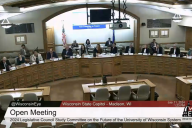You have /5 articles left.
Sign up for a free account or log in.
The National Collegiate Athletic Association rarely admits to the need to revisit an infractions case, and particularly one that strikes at the core of academic integrity issues. So when the NCAA announced an unusual and embarrassing return to the University of North Carolina at Chapel Hill to reopen an academic fraud investigation that first came to light in 2011 and resulted in narrowly constructed sanctions in 2012 that affected the eligibility of a single athlete, it marked another confidence crisis in whether the NCAA can control the powerful forces of big-time college sports.
The reopening of the case also served as a measure of vindication for those on the UNC campus and in the media who bravely withstood public ridicule and even death threats.
It is undeniable that academic cheating scandals have spiked in the past decade. A 2011 review by Inside Higher Ed found a significant rise in serious academic violations during the past decade. Some critics attribute the spike in cheating to the weakened initial eligibility standards of the NCAA’s academic reform initiatives, while others point to the inherent incentives garnered from winning.
Recent media stories document a trend of selective universities admitting athletes with woefully unprepared reading skills. They are handed to academic support advisers who manage them in predetermined class schedules and place them in academic majors that neither educate them nor prepare them for a career. The university’s traditional deal with the athlete is a bona fide college education in exchange for athletic talent. Too often the promise of an education is unfulfilled. The spikes in these fraud cases are but a fraction of the daily fraud perpetrated against athletes, and the second-class education given to them.
Several highly publicized academic scandals in major athletic programs have gone largely unaddressed by the NCAA. The University of North Carolina fraud case exposes numerous serious allegations of fraud and cover-up by athletic staff, coaches, faculty and administration, with an emphasis on shooting the messengers. The scandal has been a painful and costly journey for this great public university characterized by a steady leeching of damning indictments from former athletes and a former staff whistleblower in national media.
The focus of the scandal is on a former professor at UNC facing a felony charge (now dropped in exchange for cooperation with UNC) of receiving a $12,000 payment for a class he didn’t teach. In the interim, several investigations conducted at the request of the university administration have consistently concluded that this was not an athletic scandal.
In May 2014, the university contracted with Kenneth Wainstein, at $990 per hour, to conduct an independent investigation of the scandal. Advantaged by the cooperation of the professor and his former administrative assistant, Wainstein appears to be sharing his findings with the NCAA. Wainstein’s investigation has prompted a reexamination of the claims from Mary Willingham and others of a widespread and long-term academic fraud scheme designed to keep unprepared athletes competing.
The shared findings may expose the method used to protect the eligibility of underprepared basketball and football athletes through classes that were designed to secure high grades, demanded little time or work in the form of an often-plagiarized paper, and denied them the opportunity for the education the NCAA proudly advertises as its primary mission.
Although UNC offers the most recent example of fraudulent eligibility schemes to maintain prized athletes, recent history has demonstrated similar instances at other major athletic programs and a disturbing trend. In 2006, a scandal at Auburn University revealed unusually large numbers of directed readings courses from a “jock doc” to football players to enhance their likelihood of remaining on the field in exchange for no attendance and little work. In what is commonly known as major clustering, one sociology professor called his department a dumping ground for athletes. The NCAA did nothing.
In 2008, the University of Michigan discovered a similar scheme perpetrated by an athletics-friendly professor there who provided at least 251 independent studies courses to varsity athletes from 2004-2007 on the subject of study skills. The NCAA failed to act.
These three similar instances of obvious breaches of academic integrity to secure athletes’ eligibility shared the same reluctance of the NCAA to investigate further. It should not be surprising that NCAA rule changes in minimum initial eligibility standards and punishment for those institutions failing to meet progress toward degree standards in 2003, enacted under the banner of “academic reform,” brought increased pressure on schools to protect their investments in athletic talent.
Instead of acting on these lapses of academic integrity and educational abuses of athletes, the NCAA Academic Cabinet and Management Council spent months in an effort to study the definition of academic misconduct and when schools are obligated to report instances of fraud. After months of deliberation, not much has changed. Its new interpretation, issued in April 2014, looks very similar to the NCAA definition of academic fraud issued in 2000.
Academic fraud is not a complicated concept. For NCAA fraud to occur there must be two ingredients: an athletics nexus with the participation of athletics personnel or other institutional staff, and a fraudulent advantage affecting the eligibility of the athlete. Members of the NCAA cabinet described a reticence to interfere with institutional academic misconduct policies
Perhaps the new NCAA official interpretation defining what constitutes NCAA academic fraud spurred the reopening of the case at UNC, but the constant public outrage and allegations from athletes on CNN, HBO's "Real Sports With Bryant Gumbel," Bloomberg News, The Huffington Post, The New York Times, the Raleigh News and Observer and others were more likely the catalyst.
Media have exposed athletes who are admitted to selective institutions with severe deficiencies in basic reading skills and systematically channeled through a series of fraudulent classes, friendly faculty and non-rigorous academic majors tailored to maintain eligibility. The fraud begins when admissions directors of selective institutions, at the directive of their their campus presidents, admit unprepared but NCAA-qualified athletes. The eligibility of these marginal athletes is cleverly managed with the assistance of some faculty.
The NCAA’s lax admission standards for student athletes incentivize schools to sacrifice integrity and the education of the athletes who will never “go pro.” Why do we continue to ignore the truth that each new recruiting class brings athletes who simply cannot do college-level academic work? It seems ludicrous to expect highly marginal athletes to maintain their coursework while they also work a full-time physical job with the risk of serious injury. The athletes deserve better.
To make good on the NCAA’s promise of a meaningful “world class education,” we should reconsider initial eligibility standards to ensure that athletes admitted to our institutions have obtained the necessary learning skills to be competitive in the classroom. Athletes admitted to our institutions should fall within one standard deviation of the academic profiles of their entering classes. This range of preparedness provides a reasonable skill level to compete with non-athlete classmates. At the very least, institutions must develop intensive, measurable literacy programs to support the educational needs of our underprepared athletes. The current academic culture appears to be a step removed from the instruction necessary for many of these students to be successful. Let’s be realistic about the priorities of students and work together with coaches to ensure that college readiness and academics are priorities.
It is critical that academic support programs are not physically or organizationally housed in athletics. All academic programming for athletes such as tutoring, supplemental instruction, and reading and writing support should be directed and monitored by educators hired by the university who work closely with the student body.
A higher education is a potential way out of poverty, but if we do not make certain that our gifted revenue sport athletes have mastered basic academic skills before they embark on serious college study, then we have not only failed these students, but we have exploited them too.
The NCAA has avoided its shared responsibility with member institutions to curb the widespread academic fraud and eligibility schemes so prevalent throughout our institutions engaging in big time sports. It is wishful thinking to believe the NCAA will reform itself in the radical means necessary to restore public confidence.
We believe that this is moment for faculty to express their outrage and join the battle. Tenured faculty members on the department, college and faculty senate levels must assume responsibility for the academic rigor and integrity of their institutions by insisting on transparency in grading trends. Rather than deliberate institutional castigation of whistleblowers for bringing allegations of serious fraud to light, faculty outraged about academic integrity at their institutions must act.








